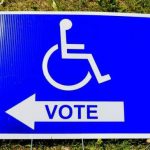A judge rejected the Delaware Republican Party’s attempt to stop universal vote-by-mail in the state. Delaware’s Legislature authorized vote-by-mail for the 2020 election cycle, citing the need to ensure the continuity of government operations amid a pandemic which made in-person voting dangerous.
The bloc of eligible voters with disabilities is almost 40 million people strong, according to a recently published report from the Rutgers University Program for Disability Research. It has grown almost 20 percent in the past 12 years. Combined with the number of voters who live in the same household as an individual with a disability, this group accounts for a quarter of the U.S. electorate.
UD experts in language and communication disorders suggest that parents and speech-language professionals be flexible and communicate about their respective needs and observations as children who receive speech therapy and related services return to school and resume telehealth sessions. They also emphasize that the child’s environment and digital tools can have a significant impact on the session’s effectiveness.
Disability community leaders weigh in on the late U.S. Supreme Court Justice Ruth Bader Ginsburg’s contributions to disability rights. Ginsburg wrote the majority opinion in the landmark Supreme Court case Olmstead v. L.C. The decision established that community living, if it is possible to accomplish with “reasonable accommodations,” is a right protected by the Americans with Disabilities Act.
Brian Perry, a 40-year-old self-advocate who is a six-sport athlete in Special Olympics Delaware and a seven-year Aramark employee, will appear in a National Down Syndrome Society video airing in Time Square in New York City Sept. 20. Perry, who is one of 500 people whose photos will be shown in the video, says he hopes images of himself and other adult self-advocates will help parents of children with Down syndrome “imagine what their children will be able to do when they are grown.”





